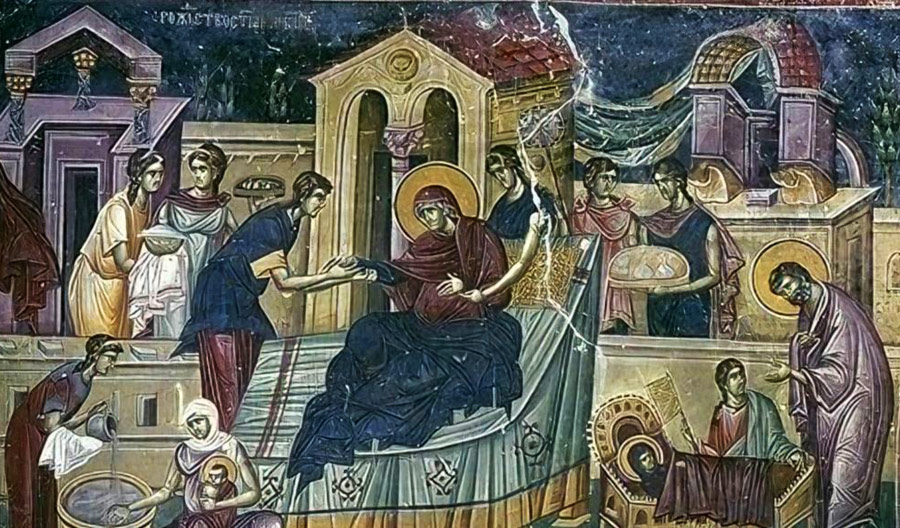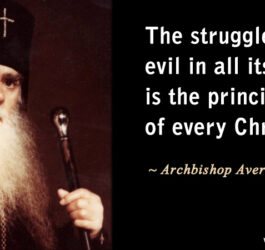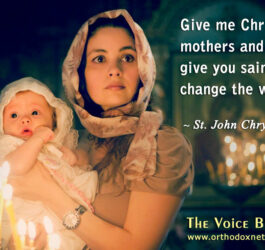 by Fr. Richard Rene –
by Fr. Richard Rene –
As disciples of Jesus Christ, we are continuing striving to accept and accomplish God’s will. Finding this willingness is often our greatest struggle.
![]()
According to the traditional account, the Virgin Mary was born of a woman named Anna, who was barren in her old age. The story itself echoes a number similar stories throughout the Old Testament. The most well-known is that of Sarah, who bore Isaac in her old age by God’s word. Jacob and Esau were born to Isaac and Rebekah as an answer to prayer, because she was barren. And then there was Hannah, who bore the prophet Samuel in her barrenness, and Elizabeth, who bore the prophet and forerunner John in her old age by a similar miracle.
In the world of the Old Testament Scriptures, one of the main signs of God’s blessing was the provision of children. The Psalmist reflects this basic understanding when he says, “Your wife will be like a fruitful vine within your house; your children will be like olive shoots around your table. Lo, thus shall the man be blessed who fears the LORD… May you see the prosperity of Jerusalem all the days of your life! May you see your children’s children! Peace be upon Israel!”
If obedience to God’s commandments resulted in the blessing of children, barrenness was the sign that God was withholding His blessing, usually because His people were not keeping His law. And what if the barren women were themselves righteous and obedient, as Sarah, Rebekah, Hannah and Elizabeth undoubtedly were? In the symbolism of the Scriptures, the message is profound: their failure have children was a sign that humanity is fundamentally unable to keep the Law by its own initiative; we need something more than mere righteousness. The miraculous births from these barren women prophesy that God Himself would have to extend His grace—through His own Son—to fulfill the law and pour out His blessings on His people.
In this sense, the birth of the Theotokos is not just another Old Testament story in the line of Sarai, Rebecca, Hannah and even Elizabeth. Unlike those other women, Mary is the one who gave birth to God the Word. She does not so much represent the old Israel, waiting for God to have favor and redeem humanity, so much as she represents the new Israel—the people of God who have received the fullness of God’s Word in Christ. As such she embodies not so much the human need for God’s grace as much as the human willingness to receive God’s grace—by hearing His Word and accepting it. That the Virgin was herself born of a barren woman, then, tells us in the poetry and symbolism of the Church that not only do human beings need God’s grace in order to fulfill their destiny as His children, but even more than that, the human willingness to receive God’s grace is itself something God gives!
As disciples of Jesus Christ, we are continuing striving to accept and accomplish God’s will. Finding this willingness is often our greatest struggle. We know the right thing to do, but we cannot bring ourselves to do it. Ours is the anguish of the Apostle Paul who said, “I see in my members another law at war with the law of my mind and making me captive to the law of sin which dwells in my members. Wretched man that I am! Who will deliver me from this body of death?”
Today’s feast tells us that willingness itself is a gift. Our task is not primarily to obey God’s Word by a sheer act of will—we cannot do this because of our spiritual barrenness. Nor can we even force ourselves to be willing to obey Him, for in that too our wills are drought-stricken and dry.
Rather, our first and foremost task as Christians, laid out for us at the beginning of this Church year, is simply to be open—simply to cry out for the willingness to do what is right.
In that cry we make a space within ourselves, a womb for God’s mercy to come and fill us with the willingness to bear Christ in our bodies, and in bearing Him who alone fulfilled the commandments of God, to find the righteousness for which we were created as children of the Most High.
—————————————————
Excerpts from the sermon Finding Willingness Is Often Our Greatest Struggle on the Feast of the Nativity of the Theotokos. (Minor organizational edits to optimize readability and emphasize key points made by Chris Banescu.)



